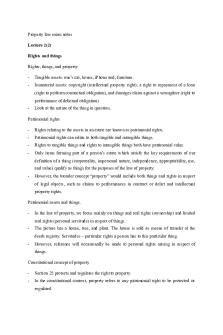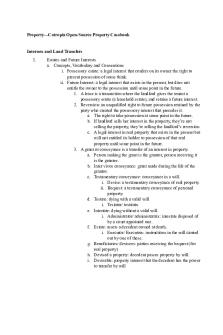Note 3 - Property Law PDF

| Title | Note 3 - Property Law |
|---|---|
| Author | Kiet Le |
| Course | Property |
| Institution | University of Georgia |
| Pages | 6 |
| File Size | 59.2 KB |
| File Type | |
| Total Downloads | 59 |
| Total Views | 168 |
Summary
Property Law...
Description
Transferability: Freely alienable, devisable, and descendible under the same conditions stipulated in the original transfer.
Example: O conveys "to G and his heirs but if Alaska secedes from the U.S., then O has the right to re-enter and re-claim the land."
Future Interest: Right of Entry or Power of Termination
Fee Simple Subject to an Executory Limitation - A fee simple defeasible that is subject to divestment in favor of someone other than the grantor if a specified event happens. The future interest in this case belongs to a third party.
Characterized by who holds the future interest rather than the words and phrases. The words and phrases are the same as the other fee simple defeasibles. A transferee holds the future rights rather than the transferor.
Transferability: Freely alienable, devisable, and descendible under the same conditions stipulated in the original transfer.
Example: O conveys "to G and her heirs so long as Alaska does not secede from the United States, then to M and her heirs."
Future Interest: Executory Interest
Fee Tail - An estate that is heritable only by specified descendents of the original grantee, and that endures until its current holder dies without issue. Most jurisdictions have abolished fee tail with the exceptions of Delaware, Maine, Massachusetts, and Rhode Island. An estate that has its duration determined by the lives of the lineal descendants of a particular person.
Created by a conveyance to a named person and "the heirs of his body." If O conveys Greenacre "to B and the heirs of his body," B has a fee tail.
Transferability: The fee tail is alienable only until the current possessor dies. The fee tail is not devisable, but is inherently descendible.
Example: O conveys "to G and the heirs of his body."
Future Interest: Reversion
Fee Tail Male - A form of fee tail which passes only to male lineal descendants.
Fee Tail Special - A fee tail that restricts the eligibility of claimants by requiring a claimant to prove direct descent from the grantee and meet the special condition in the grant.
Fiduciary - A person who is required to act for the benefit of another person on all matters within the scope of their relationship; one who owes to another the duties of good faith, trust, confidence, and candor.
First Possession Theory - If you were there first, then you may claim the unowned thing or land. It offers a practical explanation for how unowned things became property. It describes how property rises arose, but not why it makes sense for society to recognize these rights.
First come, first serve!
Five Fundamental Theories of Property Law (List) - First Possession Theory Locke's Labor Theory Utilitarian Theory Civic Republican Theory Personhood Theory
Forfeiture Restraint - A restraint that leads to a forfeiture of title if the transferee attempts to transfer her interest.
Four Implications of Property Rights - 1. Property rights are defined by government 2. Property rights are not absolute 3. Property rights can be divided 4. Property rights evolve as law and society changes
Freehold Estates - An estate in land held in fee simple, in fee tail, or for term of life; any realproperty interest that is, or may become, possessory.
Fulkerson v. Van Buren (1998) - Adverse Possession
Future Interest - The right to possession at a future date.
Future Interests Retained in a Transferee - 1. Remainder a. Vested Remainders i. Indefeasibly Vested Remainder ii. Vested Remainder Subject to Divestment iii. Vested Remainder Subject to Open b. Contingent Remainder 2. Executory Interest
Future Interests Retained in a Transferor - 1. Reversion 2. Possibility of Reverter 3. Right of Entry
Gift - The immediate transfer of property rights from the donor (the person making the gift) to the donee (the person receiving the gift), without any payment or other consideration.
Gift Causa Mortis - A gift of personal property made by a living person in contemplation of death.
Elements: 1. Donative Intent 2. Delivery 3. Acceptance 4. Donor's Anticipation of Imminent Death
Good Faith Purchaser - In adverse possession of chattels, many times the debate of ownership is between someone who purchased something without knowing that there was debate regarding possession.
Grantee - The person to whom the interest in the land is being conveyed or granted.
O to A.
Grantee is A.
Grantor - The person who is conveying or granting the interest in the land to someone else.
O to A.
Grantor is O.
Gruen v. Gruen (1986) - Inter Vivos Gift
Gurwit v. Kannatzer (1990) - Adverse Possession
Hannah v. Peel (1945) - ∏ found a dusty brooch on a windowsill in the requisitioned house owned by ∆. ∏ turned the brooch in to the police, and when no one came forward to claim it, the brooch was returned to ∆. ∆ sold it. ∏ brought a claim against ∆ that the brooch was his.
A finder has the second-most rights in the world to the property behind the rightful owner.
Finders
Haslem v. Lockwood (1871) - ∏ employed people to gather manure on the street for use on his land. ∆ saw the piles made by ∏'s workers and took them away himself. Court awarded superior ownership to the abandoned property to the first finder, ∏.
This case applies Locke's Labor Theory of property, where the ∏ mixed labor which he owned with the abandoned property and gained ownership rights in the process.
Abandoned property belongs to the first occupant, the ∏, who had changed its original condition and greatly enhanced its value by his labor.
Finders Locke's Labor Theory
Heir Apparent - People who may become heirs upon the death of a person that dies intestate.
Heirs - The people who inherit real property from a decedent who dies intestate (without a will). Identified by statute in each state. They usually include the person's spouse and children. If no spouse or children have survived the decedent, heirs may also include grandchildren, parents, siblings, and other relatives. Determined at time of death--no living people have them.
Holographic Will - A will that is handwritten by the testator. Such a will is typically unattested. Today they are recognized in about half of the states.
Howard v. Kunto (1970) - Adverse Possession
Indefeasibly Vested Remainder - A remainder is vested if (1) it is created in an ascertainable person and - A person who is both alive and identifiable at the time of the transfer.
(2) it is not subject to a condition precedent other than the natural termination of the prior estate. -A condition precedent is a condition that must be met before the remainder can become possessory, other than the natural termination of the prior estate.
Inter Vivos Gift - The ordinary gift of personal property that one living person makes to another, like the gift at a birthday party.
Elements: 1. Donative Intent 2. Delivery 3. Acceptance
Intestate - A decedent dies without a will.
Intestate Distribution Step 1: Issue and Surviving Spouse - Issue are lineal descendants--children, grandchildren, and so forth. If the decedent leaves a surviving spouse, the property will shared among the issue and the spouse....
Similar Free PDFs

Note 3 - Property Law
- 6 Pages

Note 3 - Health Law
- 6 Pages

Property Law
- 11 Pages

Property Law Essay
- 8 Pages

Intellectual Property Law – Notes
- 38 Pages

Property law exam notes
- 33 Pages

Property Law - lecture notes
- 112 Pages

Property Law A notes
- 7 Pages

Property Law Outline
- 41 Pages

Property damage - criminal law
- 6 Pages

Intellectual Property LAW
- 8 Pages

Law of Property Handout
- 58 Pages

Property Law I assignment
- 13 Pages

Property Law Statutes
- 3 Pages

Property law assignment 1
- 16 Pages
Popular Institutions
- Tinajero National High School - Annex
- Politeknik Caltex Riau
- Yokohama City University
- SGT University
- University of Al-Qadisiyah
- Divine Word College of Vigan
- Techniek College Rotterdam
- Universidade de Santiago
- Universiti Teknologi MARA Cawangan Johor Kampus Pasir Gudang
- Poltekkes Kemenkes Yogyakarta
- Baguio City National High School
- Colegio san marcos
- preparatoria uno
- Centro de Bachillerato Tecnológico Industrial y de Servicios No. 107
- Dalian Maritime University
- Quang Trung Secondary School
- Colegio Tecnológico en Informática
- Corporación Regional de Educación Superior
- Grupo CEDVA
- Dar Al Uloom University
- Centro de Estudios Preuniversitarios de la Universidad Nacional de Ingeniería
- 上智大学
- Aakash International School, Nuna Majara
- San Felipe Neri Catholic School
- Kang Chiao International School - New Taipei City
- Misamis Occidental National High School
- Institución Educativa Escuela Normal Juan Ladrilleros
- Kolehiyo ng Pantukan
- Batanes State College
- Instituto Continental
- Sekolah Menengah Kejuruan Kesehatan Kaltara (Tarakan)
- Colegio de La Inmaculada Concepcion - Cebu
